|
Court Experts in Bulgaria - Ethical Standards and Mechanisms for Control over their Activity (2006) This publication is a part of the project "Civil Control over Court Experts", implemented by Transparency International - Bulgaria with the financial support of Judicial Strengthening Initiative for Bulgaria (USAID). The publication includes an analysis of current legislation, regulating the status and functions of court experts, as well as a set of recommendations for ethical standards in their activity, produced by the project's legal expert team. It also includes a report of a social survey, incorporating a model for effective control over the work of court experts, together with the presentations, conclusions, opinions and commentaries delivered during the course of the national round table "Court Experts in Bulgaria - Ethical Standards and Mechanisms for Control over their Activity", held on 22 June 2006. |
 |
|
Political Corruption: Challånges and Counteraction Mechanisms (2006) The current publication is a result of the work of Transparency International – Bulgaria in implementing the project “Political corruption: Challenges and Counteraction Mechanisms”, realized with the financial support of the European Union. The publication presents the outcomes of an analysis of the Bulgarian legislation in the area of financing of political parties, comparative analysis of the relevant legislation in a number of EU countries, as well as data from a series of social surveys and political analyses, conducted by TI-Bulgaria expert team.The publication reflects the recommendations of national and international experts about the most effective approaches and models for raising transparency, accountability and control over the financing of political activity in Bulgaria. The book also presents and analyses for the first time the work over a number of yearly studies of TI-Bulgaria, which resulted in the creation of two indexes for measuring the level of transparency of the Bulgarian political life – Index for Transparency of Financing of Political Parties and Index for Transparency of Financing of Electoral Campaigns. |
 |
|
Bulgaria's EU Accession and the Judicial Reform: Challenges before the National Prosecution Office (2006) The publication is a part of the TI-Bulgaria project “Strengthening Capacity of the National Prosecution Office in the Context of Curbing Corruption”. The implementation of the project focused entirely on the activity of the Bulgarian prosecution office, recognizing its crucial role in the fight against crime, and particularly against corruption. The book presents a number of analyses, studies, the elaborated Communication Strategy of the National Prosecution Office, Strategy for Strengthening the Capacity of the National Prosecution Office for Counteracting Corruption Crimes, as well as a discussion, organized within the framework of the international conference “Challenges, facing the National Prosecution Office in the context of the Bulgarian judicial reform and the membership of Bulgaria within the EU, held on 6 June 2005. |
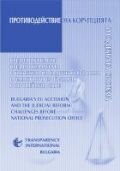 |
|
Effective Public Communication of the Prosecutor's Office in Curbing Corruption (2005) This publication is the result of the activities of Transparency International - Bulgaria on a project realized with the kind financial support of the British Embassy in Bulgaria. The publication aims to present specialized information in a systematic way and to facilitate the efficiency of the communication between representatives of the Prosecutor's Office and civil society in Bulgaria. |
|
Granting a Concession on Trakia motorway (2005) The aim of the interim report is to present the results of an investigation, conducted by Transparency International - Bulgaria until April 2005, which have been systemized in three major areas. The publication includes conclusions about the transparency, legality and feasibility of the prepared contract for granting a concession on Trakia motorway. |
|
Introduction of Anti-corruption Policies and Practices in the Bulgarian Judicial System: Assessing the Effect (2005) This publication was made possible trough support provided by the US Agency for International Development (USAID) Bulgaria and East-West Management Institute, Inc (EWMI). |
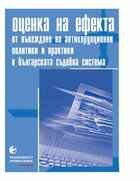 |
|
Curbing Corruption and the Judicial System: Challenges Facing Prosecution in the Context of Curbing Corruption in Bulgaria (2004) This publication is a part of the project “Building Capacity of the National Prosecution Office in the Context of Curbing Corruption in Bulgaria” implemented by Transparency International – Bulgaria. The project is focused on the functioning of the National Prosecution Office due to its crucial role in the fight against crime and particularly its role in the context of curbing corruption in Bulgaria. The process of approximation of Bulgarian law to European anti-corruption standards has been largely successful. However, the next major stage in legislative adaptation is related to the execution of an effective law enforcement, which depends to a considerable extent on the creation of working law-enforcement mechanisms, as well as on the existence of a competent and independent judicial system, having the fool potential to enforce the enacted legislation. By launching this initiative TI-Bulgaria aims to offer working mechanisms for internal control, as well as to improve the structural efficiency of the Prosecution Office in view of its role in combating corruption. Another important task includes formulating and proposing measures to build the capacity of the Prosecution in enforcing anti-corruption criminal legislation. For that purpose TI-Bulgaria will carry out analysis of international legislation, in order to spot the best anti-corruption practices suitable for adoption in the Bulgarian national context. Together with examining the best international anti-corruption practices the initiative also envisages conducting sociological surveys and legal analysis of the Bulgarian criminal legislation, as well as formulating concrete recommendations for improving the capacity of the Prosecution Office in the fight against corruption. |
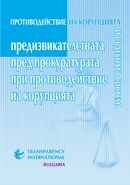 |
|
Curbing Corruption and the Judicial System. Prosecution Office - Status and Legislative Issues (2004) "The Bulgarian Prosecution Office and the fight against corrupt practices - status and legislative issues" - A.P. Dr. Nikola Manev The subject of this publication is the status of the Bulgarian Prosecution Office, as well as the legislative issues, concerning its activity. The task of the current survey is to outline the weaknesses in legislation and procedure that decrease the level of effectiveness of the functioning of the Prosecution Office. Its elaboration has a significant public importance in view of the considerable legal reform efforts that has been running in the past few years in Bulgaria. Analysis of the substantial criminal legislation with a view to its effectiveness in the fight against corruption" - Georgi Rupchev The aim of this analysis is to outline the existing problems concerning the interpretation and application of the substantial regulations for incrimination of corruption that are subject to amendments in the 2002 Criminal Code. In his analytical work the author has taken into consideration the regulations included in the contemporary international anti-corruption instruments, the explanantory reports attached to them, different foreign legislations, as well as the theses included in the Bulgarian criminal law doctrine, the legal practice related to applying the respective orders of the 1951 Criminal Law (since 1956 - Criminal Code) and the Criminal Code in force (enacted in 1968). The conducted analysis has identified some of the gaps and inaccuracies in the current legal order. A list of suggestions for legislative changes has been elaborated on that basis and included in the final chapter of this publication. |
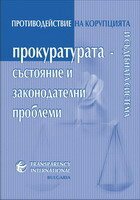 |
|
Monitoring of Corruption Practices in the Sphere of Municipal Property Management and Public Procurment in Bulgarian Municipalities (2004) The following publication is a result of the one-year project of Transparency International - Bulgaria - "Monitoring of the Corruption Experience in the Sphere of the Municipal Property Management and Entrusting with Public Commissions in the Bulgarian Municipalities" Within this project an investigation of individual corruption signals was undertaken by the Association, because TI itself, trying to curb corruption at national, regional and international level, was not engaged with particular cases, it didn't mention names and also TI didn't attack concrete personalities. As we all know, however, corruption is always linked with a particular case, is always originated from a concrete decision, made by an individual and always sacrifices a concrete person. Related to this a new, indirect approach was successfully applied at regional level - during a year, lawers and journalists together were investigating corruption signals in two regional cities - Russe and Varna. In the publication are viewed the methods and the particular fases of the investigation. In its last section an expert assessment of the investigation of the particular cases of corruption experience is included, adding also valueable recommendations to the potential investigators. |
 |
|
International Criminal Justice in the Context of Bulgarian Legislation (2004)
|
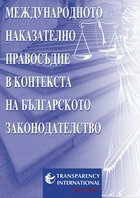 |
|
Conflict of Interests in Public Office. Patterns and Mechanisms for Curbing Corruption (2003) Conflict of interests is one of the most widespread forms of corruption, and its presence in public administration is a sign of the necessity to search for mechanisms of its restraining. Undoubtedly the conflict of interests can be found in all aspects of public life, where non compliance between personal interests and official duties of a particular person is possible. The Transparency International - Bulgaria survey is focussed on the following problem: conflict of interest in the Bulgarian administration, not because it is not strongly expressed in the legal system, nor in the media, for example, but because the widening of the context would lead to a dilution of the concept and to a search for similar marks without the presence of a starting point. The lack of "Bulgarian model" of reglamentation of this problem, provokes the participants of the survey to look for effective models, existing in other countries' legislations and to present the best European and global practices for coumteraction to the conflict of interests. The aim of this publication is to present different patterns and mechanisms of restraining the conflict of interests in public office. It present a review of the operating legislation; shows up public office issues according to experts and those, who are part of it; and last but not least, searches for and suggests decisions. A significant section of the publication is the presented catalogue of measures for restraining the conflit of interests in public office, the aim of which is to suggest effective patterns of identification and official's response to a situation of conflict of interests, as a condition of not allowing its manifestation within public administration. |
 |
|
Funding of Political Paties and Election Campaigns in South-Eastern Europe: Overcoming Corruption Experience and Enhancing Control - Towards a Comparative Survey (2003) Political corruption is a significant obstacle to democracy development and is perceived as a very big problem. According to the Transparency International Global Corruption Barometer, three out of ten respondents point out political parties as the institutions from which they would eliminate corruption, if they had a magic wand. The survey was conducted among citizens of 47 countries and was presented in July 2003. The issue of political parties and election campaings funding very often is a subject of increased consideration by the media and is the main reason for decreasing citizens' confidence in political institutions. According to the survey, 20.2% of the Bulgarian citizens indicate political parties as most corrupt institutions. The aim of this publication is to present the Bulgarian and international investigators positions on question about political parties and election campaigns funding. The publication focuses on the best practices and mechanisms for financing political parties, as well as the problems facing South East European countries. |
|
Draft of Ethical Code for Judicial Administrative Officials (2002) |
|
Legal Compliance and Transparency of the Tender Procedure for the Granting of an Individual Licence for the Installation, Maintenance and Operation of a Second Nation-wide GSM-Standard Public Mobile Cellular Network in the Republic of Bulgaria (2001) Monitoring Report: Evaluation of the Open Bidding Auction on the Granting the Second GSM License in Bulgaria in Terms of Transparency and Legal Compliance |
|
BTC Privatization Poceedings: Draft Contract Analysis - Transparency and Legal Compliance (2000) The Sale of BTC is the largest and most important privatisation deal in Bulgaria. Closing the sale definitely has significant implications for the Bulgarian economy. The completion of such a deal of this scale was indicative not only of the willingness of the Government to meet its commitments undertaken within the framework of negotiations with the WTO, but also of its policy toward meeting the criteria for EU accession. The BTC privatisation proceedings were part of the process of liberalisation of Bulgaria’s telecommunications market. The legal regularity and openness of the deal was a guarantee for ownership of the democratic values adopted by Bulgarian society. |
|
Curbing Corruption and Improving Transparency in Municipal Council Work in Bulgaria: A Policy Outlook from Seven Bulgarian Municipalities (2000) The activity of the non governmental organizations in Bulgaria in 1998 and particularly in 1999 promoted overcoming the extremely negative impact of the situation on ordinary people's attitude to corruption after 1989, The idea of corruption in public office was widespread; The very act of corruption was clearly articulated and evaluated as a criminal one; and the idea of how to begin overcoming the problem was about to be formed.There are two independent directions in this publication. The first one is about the current state of the public attitude to corruption, which also has a direct impact upon the attitude to the act of corruption at regional level. The second purpose of this analysis is to give recommendations about reconsidering and effective counteraction to corruption practices in the society through encouraginig public control and participation in the process of making and applying regional policy. |
|
Reference Book for Effective Advocacy at Municipal Level (2000) This publication has two purposes. The first is to outline realistic "routes", with the help of which current information about the Municipality Council activity can be received. The second aim is oriented towards the municipality councillors themselves, and marks the presence of common interest of conformation of transparency and accountability traditions in the practice of the Municipality Council. The structure of this study seeks to show spaces of common interests between citizens, administration and private sector in the process of making and applying regional policy. |
|
Public Opinion on Corruption (2000) |
|
Corruption in Contemporary Bulgaria: Policy Paper (1998) - in Bulgarian |
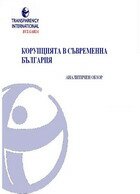 |






















